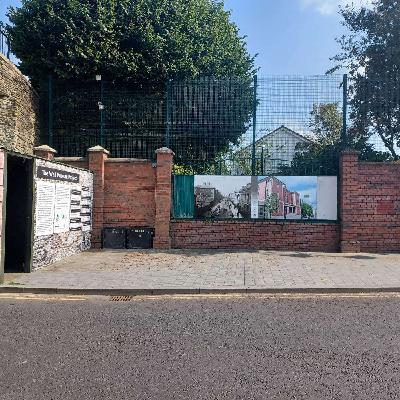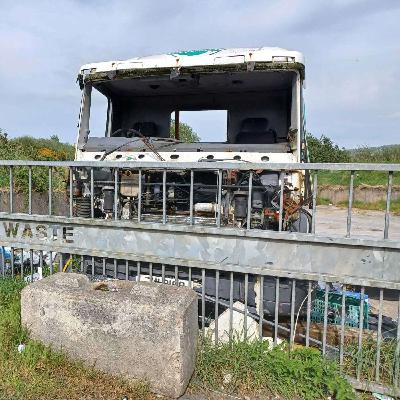The end of a series
Description
The latest series of Holywell Conversations podcasts began with reflections on the Good Friday Agreement, amidst fears that Northern Ireland’s devolution was over, and that series has now completed at a time when government has actually resumed.
Over the series’ 18 episodes two themes have been examined – the challenges holding back reconciliation within our society, and the specific problems that continue to face the North West region.
In the first episode, we heard from three people at the table negotiating the Good Friday / Belfast Agreement. Avila Kilmurray of the Women’s Coalition explained just how significant the Women’s Coalition had been in terms of successfully pushing for the Civic Forum, which many of us still mourn the loss of, as well as women’s rights and other social concerns.
We also heard from Paul Bew, Lord Bew, who was influential with David Trimble’s decision to sign up to devolution. And Ray Bassett, part of the Irish government’s team, emphasised that the Good Friday Agreement was the culmination of years of conversations between all the interested parties.
Subsequent podcasts reflected not just on the success of achieving devolution, but also how many of the optimistic expectations from 25 years ago have not been met.
Anger at the Legacy Act, just enacted, reflects the sense of legal stalemate now reached. Early in the series, Alyson Kilpatrick – Northern Ireland’s Human Rights Commissioner – made a passionate call for respect for human rights, warning specifically about the impact of what was then being called the Legacy Bill. She also expressed concerns about calls from some members of the Conservative Party to remove the UK from the European Convention on Human Rights – which is central to the Good Friday Agreement. Those warnings remain as relevant now, as when she made them early last year.
Peter Sheridan, a former senior officer with the RUC and PSNI, is now Commissioner for Investigations at the Independent Commission for Reconciliation and Information Recovery. In a recent podcast, he spoke about how events from the Troubles will be investigated as a result of the Legacy Act.
But the challenges related to criminal justice lie not just with past events. Some 25 years ago there was an assumption that paramilitary groups would fade away. Instead, some have evolved into major organised crime gangs, generating substantial sums from dealing in drugs, money laundering and extortion.
Taken together this constitutes ongoing coercive control of communities. Professor Dominic Bryan, who had been joint chair of the commission on Flags, Identity, Culture and Tradition, told us there needs to be a stronger focus on removing flags and other signals of territorial demarcation – which provide paramilitary groups with a continuing form of what might be termed legitimisation.
Elaine Crory, lobbyist at the Women’s Resource and Development Agency, made the point in a recent podcast that the operations of paramilitaries along with the history of Troubles’ violence have reinforced gender roles in our society. This has led to Northern Ireland today recording one of the highest levels of domestic violence of any place in Western Europe.
Another hangover from the Troubles that has survived a quarter of a century is the presence of peace walls – especially in Belfast, but also in Derry. In one podcast we heard from Kyra Reynolds, development worker at the Peace Barriers Programme, on the ongoing work at Derry’s Bishop Street interface, bringing populations together who come from different traditions.
When the Good Friday Agreement was signed we expected not only an end to peace walls, but also the achievement of a peace dividend. Yet analysis has suggested most of the so-called peace dividend has gone South, not North.
Dr Ciara Fitzpatrick of Ulster University told in one podcast of the scale of poverty that continues to affect our society, all these years on from the peace talks and agreement. Significantly, she connected the ongoing deprivation also with the continuing presence of paramilitaries. She believes that poverty is helping to keep them going.
Our podcast series also considered why Derry and the North West have specifically not prospered as expected after devolution. We examined why it has not been more successful, as the poorest area in NI, in gaining funding from the UK government’s Levelling-Up Fund; the city’s limited transport connectivity; the absence of a full size university campus; and the slow progress at Derry’s two major regeneration sites of Ebrington and Fort George. As well as that we reflected on what is possibly Europe’s worst illegal waste dump, Mobuoy, in a Derry suburb.
This series is now over, but all the podcasts are available on the Holywell Trust website, along with an additional new episode reflecting on the series. Holywell itself has a comprehensive programme of new activities, details of which are also on the website. That is it, for now, from us.
Disclaimer: This project has received support from the Northern Ireland Community Relations Council which aims to promote a pluralist society characterised by equity, respect for diversity, and recognition of interdependence. The views expressed do not necessarily reflect those of the Community Relations Council.





















